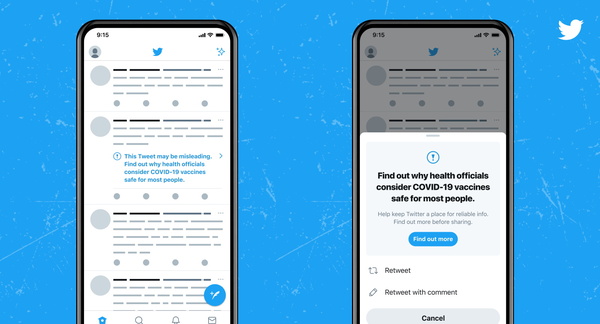
Twitter has detailed how it will target users for misinformation regarding COVID-19 vaccines.
COVID-19 vaccines are rolling out around the world and central to most government's plans to curb their viral epidemics. With such large numbers of inoculations required to make an impact, it is not surprising there is a lot of confusion and questions about the new vaccines on offer.
Nowadays social media platforms will fill a void with information of varying quality and accuracy. The question of how to balance the rights of users to share information freely and protect against the spread of misinformation has been around long before the COVID-19, but the pandemic has focused attention on the problem.
Social media firms have already punished users for what they deemed to be misinformation regarding the pandemic itself. Since introducing its COVID-19 guidance, Twitter has removed around 8,400 tweets and challenged 11.5 million accounts.
Following Facebook and others, Twitter is now taking aim at COVID-19 vaccine misinformation on its platform. It will target infringing content with labels, strikes, suspensions, and permanent bans.
A tweet that is deemed to be spreading misinformation will be labeled in much the same way Twitter labeled tweets in the aftermath of the 2020 US President Elections. Tweets subjected to the label cannot be re-tweeted by others (but can be quote-tweeted) and will contain a link to authoritative information on vaccines.
For more serious violations, Twitter has outlined its strike system and the consequences of it:
The company has detailed its guidance more in a blog post.
Nowadays social media platforms will fill a void with information of varying quality and accuracy. The question of how to balance the rights of users to share information freely and protect against the spread of misinformation has been around long before the COVID-19, but the pandemic has focused attention on the problem.
Social media firms have already punished users for what they deemed to be misinformation regarding the pandemic itself. Since introducing its COVID-19 guidance, Twitter has removed around 8,400 tweets and challenged 11.5 million accounts.
Following Facebook and others, Twitter is now taking aim at COVID-19 vaccine misinformation on its platform. It will target infringing content with labels, strikes, suspensions, and permanent bans.
A tweet that is deemed to be spreading misinformation will be labeled in much the same way Twitter labeled tweets in the aftermath of the 2020 US President Elections. Tweets subjected to the label cannot be re-tweeted by others (but can be quote-tweeted) and will contain a link to authoritative information on vaccines.
For more serious violations, Twitter has outlined its strike system and the consequences of it:
- One strike: no account-level action
- Two strikes: 12-hour account lock
- Three strikes: 12-hour account lock
- Four strikes: 7-day account lock
- Five or more strikes: permanent suspension
The company has detailed its guidance more in a blog post.











